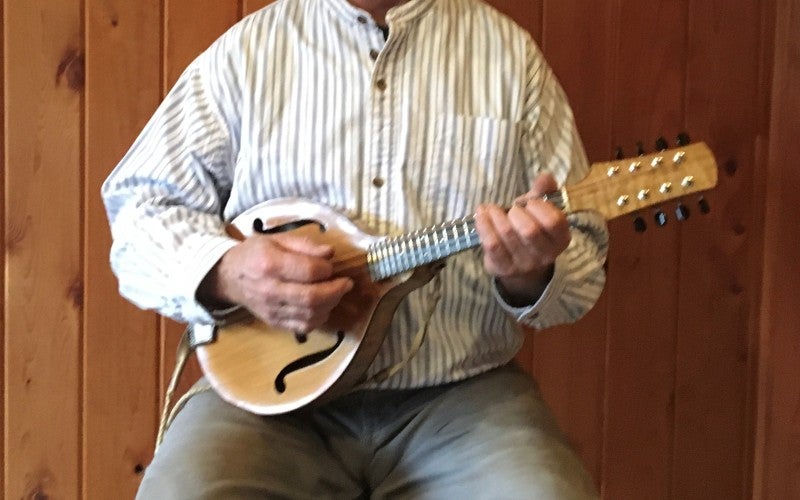Bryan Ibach (Coquille) is a mandolin and ukele maker, cabinet maker, finish carpenter, and plays the mandolin with several groups on Oregon's south coast. Ibach started out in construction, working as a carpenter and eventually doing finish carpentry and cabinet making. Over the years, he also started to play old time music, mostly on guitar and then eventually on mandolin. He applied his cabinet making skills to mandolin building and has built and sold several.
Bio
Bryan Ibach (Coquille) is a mandolin and ukulele maker, cabinet maker, finish carpenter, and plays the mandolin with several groups on Oregon's south coast. Ibach started out as a carpenter building pole barns and then custom-built homes. He eventually focused on finish carpentry and cabinet making, which he did for over 30 years. While he was in high school, he started to play music, first Simon and Garfunkel songs on harmonica and then Grateful Dead tunes on his father's guitar. Later on, he got into Irish tunes, picked up the mandolin, and played in an Irish band for 15 years. His two loves came together as he applied his cabinet making skills to mandolin building. Ibach was born and reared in Utah, where he went through school. His maternal grandparents were Italian immigrants, and Ibach notes that "my much-admired uncle, Bruno, was a carpenter and cabinet maker and I was always inspired to follow his path." In his 20s, after college, Ibach came to Oregon and eventually settled in Coos County near Coquille. Much to his surprise, his custom cabinet and custom furniture business took off. Eventually, he and he wife bought an acreage near Coquille, where they also raise sheep. To be a good cabinet maker, Ibach explains that he uses solid wood and focused on "the more high-end approach to solid wood cabinets. . . . Really, I think attention to detail [in] any kind of craft or handiwork is the key." Two of the key differences between cabinet making and instrument making, Ibach notes are carving, "which you don't do a lot of in cabinet work and also steam bending, which you don't do in cabinet work." Mandolin building involves steaming, bending, carving, gluing, and tuning—just to name a few of the many steps involved. One that’s all done, and he's finished with sanding and scraping, the last step is the finish. "I use an oil varnish, which is like a hand-rubbed finish . . . you can still see the grain in the wood. And I just love the feel of it. It's just smooth and beautiful." A critical part of construction, which Ibach prefers to do by listening rather than using electronic, is tuning. He "goes for the feel and the shape of the plate. And also I just listen to that tone and try to get a lower tone on the bass side and a higher tone on the trouble side. And that's kind of how it goes. And then hope for the best and have faith that it will sound good." In speaking about old master violin makers who "didn't have access to all that technology," he notes, "They just had the feel and the knowledge . . . and just the sense of how it should be, you know? And that comes with experience, I think, more than anything." And, of course, "You have to have an ear." Ibach is also attuned to the different features of different woods--the grain, the sound, etc. For both his cabinet and furniture work and his mandolin building, Ibach prefers "local woods just because it's something different and it showcases what we have here. I mean, we have some fantastic resources and wood types. And myrtlewood was one of the things that I started using that I love." Another point that Ibach stresses is learning by doing, for both cabinet making and mandolin building. "I made some mistakes. And that's how you learn by making mistakes that some mistakes are for. So. Yeah, no, I'm still good at making mistakes, I can make them really well." Despite his craftsmanship and success in making and selling mandolins, Ibach doesn’t call himself a luthier, "because to me the skill set that a true luthier has are very varied and pretty distinct. And I've never had that training. So I call myself a mandolin builder because I build mandolins." In both building and playing mandolins, Ibach acknowledges a certain serendipity. There’s a bit of magic in the doing, in the practice. He is adamant that playing an instrument changes how it sounds. "Really the best thing is to play it. It needs to be played. . . . You've got to play it, you know, keep playing. . . . It'll never it'll never sound like it should until you play it, because that's what it takes."





